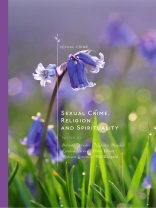This book offers a collection of original contributions to the literature on sexual crime, religion and spirituality. Does religion help people desist from sexual crime? Can it form the basis of interventions to rehabilitate people? Or does it provide justification and opportunity for committing it? What do the perpetrators say about their faith? What about the victims and survivors of sexual crime? The book asks and answers these questions and more in a unique collection of chapters – from academics, chaplains and prisoners.
The book begins with an exploration of the role, history and development of chaplaincy in the prison system over the years, before providing a more personal look through the eyes of the Lead Chaplain at Rampton High Secure hospital in the UK. Subsequent chapters weave together theories of desistance from sexual crime, and analyses of perpetrators’ accounts of their offending are also offered, alongside firsthand accounts of prisoners from a range of religions. The book concludes with a thoughtful journey through the book by the Lead Chaplain at HMP Stafford, UK. It will provide fresh insights for students and scholars of psychology, criminology, theology and social work, as well as for practitioners, chaplains, and readers with an interest in learning about sexual crime, religion and spirituality.
Inhaltsverzeichnis
Foreword; Holli Emore.- Chapter 1: Religion and the Criminal Justice System (CJS) – A Socio-Historical Overview; David Kirk Beedon.- Chapter 2: The Voice of Chaplaincy; Kevin Shaw.- Chapter 3: The Voice of a Buddhist Chaplain; Keith Commons.- Chapter 4: How might faith communities promote desistance from sexual crime? An exploration of theory; Stephanie Kewley.- Chapter 5: Understanding the experiences of religious perpetrators of sexual abuse; Daniel Micklethwaite, Nicholas Blagden & Belinda Winde.- Chapter 6: Religiously-Responsive Treatment for People Convicted of Sexual Offences; Craig A. Harper, Chris Wilson, Kerensa Hocken, Tariq Awan & Rebecca Lievesley.- Chapter 7: The voice of the service user: experiences of religion and desistance; Kerensa Hocken and Service Users.- Chapter 8: Religious victims of sexual abuse; Lisa Rudolfsson.- Chapter 9: Conclusion; Jo Honour.
Über den Autor
Belinda Winder is Professor of Forensic Psychology and Head of the Sexual Offences, Crime and Misconduct Research Unit at Nottingham Trent University, UK. She is a Co-founder and Trustee of the Safer Living Foundation charity.
Nicholas Blagden is Associate Professor and co-leads the Sexual Offences, Crime and Misconduct Research Unit at Nottingham Trent University, UK. He is a Co-founder and Trustee of the Safer Living Foundation charity.
Kerensa Hocken is a registered Forensic Psychologist at HMPPS Whatton, UK. She has oversight for the assessment and treatment of people in prison for sexual offending in the Midlands region.
Helen Elliott is Lecturer in Counselling at Bishop Grosseteste University, UK. She has a background in Forensic Psychology and is a trainee Integrative Psychotherapist.
Rebecca Lievesley is Lecturer in Psychology at Nottingham Trent University and has conducted research within the criminal justice system for many years. She is a trustee of the Safer Living Foundation.
Phil Banyard is Head of the Psychology Department at Nottingham Trent University, UK. He is a recipient of the British Psychological Society’s Award for Distinguished Contributions to Psychology Education.












